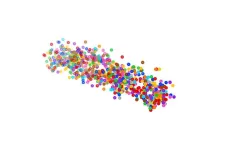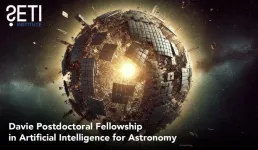(Press-News.org) UNIVERSITY PARK, Pa. — People’s bodies can be old or young for their chronological age, depending, in part, on the amount and types of stressors they have experienced. Scientists can estimate people’s biological age, but whether they use oral tissue or blood to make the measurement matters, according to a new study led by researchers in the Penn State Department of Biobehavioral Health.
Biological age — a measure of how well one’s body is functioning — differs from chronological age — the amount of time since someone was born. While chronological age can be correlated to disease risk, researchers and medical doctors can use biological age, which can be slowed or accelerated by environmental or behavioral factors, to more precisely understand a person’s risk for certain diseases, including cancers and dementia.
The correct type of tissue is needed to estimate biological age accurately, according to the study led by Abner Apsley, doctoral candidate in the Penn State Molecular, Cellular, and Integrative Biosciences Graduate Program, and his adviser, Idan Shalev, associate professor of biobehavioral health at Penn State. Their results were published in Aging Cell.
In recent years, researchers created several epigenetic clocks — tools that compare a person’s biological age to their chronological age. As these clocks have become widely available, multiple companies have begun to offer services that estimate people’s biological age by comparing customer tissue samples to established epigenetic clocks.
Researchers construct epigenetic clocks by collecting tissue samples from a large number of people and examining differences in epigenetic markers — which indicate points of DNA methylation — across the lifespan. Using machine learning to identify which epigenetic markers predict chronological age, the researchers can then determine if a person’s epigenome, or the set of markers, matches their chronological age.
In theory, knowing a person’s biological age could indicate what behaviors that person needs to modify in order to extend their life. In clinical settings, however, scientifically validated uses of epigenetic clocks are not common yet, the researchers said.
“Aging is the main driver for a host of common diseases including dementia, heart disease and cancer,” Shalev said. “Measurement of biological age is not a diagnosis of a health problem, but it can be used to identify a person’s risk for age-related conditions.”
Some commercial companies offer to measure biological age by requiring customers to spit into a test tube and mail the sample to the company. The company analyzes epigenetic information in the saliva and uses established epigenetic clocks to predict the customer’s biological age. Epigenetic clocks, however, are most commonly created using blood, not saliva, which is why the researchers in this study said they wanted to compare the performance of different tissue-sample types.
The researchers evaluated five types of tissue samples and compared them with seven epigenetic clocks. The study included 284 distinct tissue samples from 83 individuals between the ages of nine and 70 years old. In six of the seven clocks tested, the team found that oral tissue resulted in substantially less accurate estimates of biological age than blood-based samples.
“We tested three types of blood samples and two types of oral tissues — saliva and cheek swabs,” said Apsley, the lead author of the study. "For almost every epigenetic clock, the oral tissue led to significantly higher estimates of the subject’s biological age. In some cases, the estimates were 30 years higher; that is extremely inaccurate. It is very clear that the tissue used to measure someone’s biological age must match the tissue used when the clock was created. Otherwise, estimates of biological age will not be valid.”
Results from this study demonstrated that blood-tissue types led to similar biological age estimates across the different epigenetic clocks. Oral tissue performed very differently than blood tissue and was generally not as accurate, estimating older biological ages across the clocks. The one exception to this trend was the only epigenetic clock in the study created using both blood and cheek swabs. For that clock, the age estimates across different tissues were much more accurate than they were on the other clocks.
“Most of the popular clocks were created using blood samples,” Apsley said. “So, these results represent an important lesson for this burgeoning field. If companies or physicians want to use saliva or cheek swabs to measure biological age, then researchers need to develop epigenetic clocks using those tissues. Currently, blood is needed to accurately estimate biological age in most circumstances.”
While tests of biological age are not commonly measured in medical settings yet, the researchers said that biological age could be used someday to identify patients who may need medication to delay the onset of an age-related disease due to their advanced biological age. Alternatively, patients with delayed biological age might be better candidates for surgery than other people of the same chronological age. There are other uses for biological age estimates, as well.
“Researchers are still discovering how to apply biological age,” said Shalev, a Social Science Research Institute co-funded faculty member. “Our research focuses on medical applications, but epigenetic clocks have also been used with blood samples from crime scenes to help forensic scientists identify the approximate age of criminal suspects. Who knows where this field will lead us next?”
Other researchers who contributed to this study include Qiaofeng Ye, Christopher Chiaro, John Kozlosky and Hannah Schreier of the Penn State Department of Biobehavioral Health; Avshalom Caspi, Laura Etzel-House and Karen Sugden of Duke University; Waylon Hastings of Texas A&M University; Christine Heim of the Berlin Institute of Health at Charite; and Jennie Noll and Chad Shenk of the University of Rochester.
The National Institute on Aging, National Institute of Environmental Health Sciences, National Institute of Child Health and Human Development, National Center for Advancing Translational Sciences and the Penn State College of Medicine funded this research.
END
Understanding aging requires more than counting birthdays
Types of tissue samples matter when measuring a person’s biological age, or how well their body is functioning, researchers report
2025-02-05
ELSE PRESS RELEASES FROM THIS DATE:
AI tool helps find life-saving medicine for rare disease
2025-02-05
After combing through 4,000 existing medications, an artificial intelligence tool helped uncover one that saved the life of a patient with idiopathic multicentric Castleman’s disease (iMCD). This rare disease has an especially poor survival rate and few treatment options. The patient could be the first of many to have their lives saved by an AI prediction system, which could potentially apply to other rare conditions.
Detailed in a new paper published in NEJM, a group led by researchers at the Perelman School of Medicine at the University of Pennsylvania used an AI technique called machine learning to determine that adalimumab—a ...
A new tool could exponentially expand our understanding of bacteria
2025-02-05
How do bacteria — harmless ones living in our bodies, or those that cause disease — organize their activities? A new study, combining powerful genomic-scale microscopy with a technical innovation, captured which genes bacteria turn on in different situations and in different spatial environments. The technology, described January 23 in Science, promises to take the study of bacteria to the next level.
Jeffrey Moffitt, PhD, and colleagues in the Program in Cellular and Molecular Medicine (PCMM) at Boston Children’s Hospital applied MERFISH, a molecular ...
Apply for the Davie Postdoctoral Fellowship in Artificial Intelligence for Astronomy
2025-02-05
February 5, 2025, Mountain View, CA -- The SETI Institute announced the Davie Postdoctoral Fellowship in Artificial Intelligence for Astronomy, inviting researchers to refine and expand ML-driven pipelines for exoplanet discovery. The successful candidate will join the SETI Institute researcher Dr. Vishal Gajjar and his team and collaborators at the SETI Institute and IIT Tirupati in India. This project will focus on enhancing supervised CNN architectures and integrating anomaly-detection techniques to uncover subtle or unconventional signals hidden within massive datasets. The application deadline is March 15, 2025. Information about how to apply is here.
“Machine ...
New study finds students' attitudes towards computer science impacts final grades
2025-02-05
University of Delaware Associate Professor Teomara Rutherford, along with UD co-authors Hye Rin Lee, Austin Cory Bart and Andrew Rodrigues and Megan Englert of the University of Colorado Boulder, investigated changes in student motivation in first-year university CS courses. Although students’ perception of the value of CS declined over the semester, their sense of belonging and beliefs in their ability to succeed increased. Rutherford and her co-authors also found that students’ beliefs in their ability to succeed, their view of the course’s importance and their perception of its emotional cost ...
Clot-buster meds & mechanical retrieval equally reduce disability from some strokes
2025-02-05
Research Highlights:
Mechanically retrieving a blood clot blocking a medium- or small-sized brain artery was no better at reducing disability 90 days after a stroke than standard care alone (including clot-busting medication if indicated).
While researchers say using thrombectomy devices to remove blood clots is increasingly performed, this research suggests that it may not be needed in all cases.
However, because endovascular therapy seemed to be safe, it might still be used on select patients.
Note: The study featured in this news release is a research abstract. Abstracts ...
ISHLT relaunches Global IMACS Registry to advance MCS therapy and patient outcomes
2025-02-05
CHICAGO, IL USA – 5 February, 2025 – Following a five-year hiatus, the world’s only registry of patients with durable mechanical circulatory support (MCS) devices is re-launching and will begin collecting data from institutions around the globe in early 2025.
The International Registry for Mechanically Assisted Circulatory Support (IMACS) registry is operated by the International Society for Health and Lung Transplantation (ISHLT), a global multidisciplinary professional organization ...
Childhood trauma may increase the risk of endometriosis
2025-02-05
The study is an international collaboration based on previous research that has suggested a possible connection between trauma and endometriosis.
Endometriosis is tissue resembling the uterine lining that grows outside the uterus. The condition is very common among women and can cause significant pain and fertility problems for many.
– The motivation for the study was to better understand this potential link between traumatic experiences and the development of endometriosis. Specifically, we wanted to explore whether certain types of trauma were more strongly associated with endometriosis than others, and whether this potential interaction is independent ...
Black, Hispanic kids less likely to get migraine diagnosis in ER
2025-02-05
EMBARGOED FOR RELEASE UNTIL 4 P.M. ET, WEDNESDAY, FEBRUARY 5, 2025
MINNEAPOLIS – Children and young people who are Black or Hispanic are less likely to be diagnosed with migraine than those who are white when being seen for headache in a pediatric emergency department, according to a study published in the February 5, 2025, online issue of Neurology®, the medical journal of the American Academy of Neurology. The study also found they received fewer tests and less intensive treatment.
“Migraine is disabling and can significantly impact ...
Global social media engagement trends revealed for election year of 2024
2025-02-05
An analysis of more than 4 million Facebook posts created by news outlets and political parties in 2024 highlights global social media engagement trends and political polarization during a year which included elections for many countries. Giulio Pecile and colleagues at Sapienza University of Rome, Italy, present these findings in the open-access journal PLOS One on February 5, 2025.
Prior research has suggested that the tailored content presented on social media platforms may reinforce political polarization ...
Zoom fatigue is linked to dissatisfaction with one’s facial appearance
2025-02-05
Facial appearance dissatisfaction is associated with virtual meeting (VM) fatigue, which prompts the use of impression management behaviors and results in lower intention to adopt VM technologies, according to a study published February 5, 2025, in the open-access journal PLOS One by Chaeyun Lim from Michigan State University, U.S., and colleagues.
The increasing reliance on VMs has led to a pervasive experience of VM fatigue, commonly referred to as Zoom fatigue. This phenomenon has significant implications for workplace productivity and individual well-being. Despite VM fatigue’s critical role in shaping workplace interactions and digital inclusion in emerging ...
LAST 30 PRESS RELEASES:
Exercise and nutritional drinks can reduce the need for care in dementia
Michelson Medical Research Foundation awards $750,000 to rising immunology leaders
SfN announces Early Career Policy Ambassadors Class of 2026
Spiritual practices strongly associated with reduced risk for hazardous alcohol and drug use
Novel vaccine protects against C. diff disease and recurrence
An “electrical” circadian clock balances growth between shoots and roots
Largest study of rare skin cancer in Mexican patients shows its more complex than previously thought
Colonists dredged away Sydney’s natural oyster reefs. Now science knows how best to restore them.
Joint and independent associations of gestational diabetes and depression with childhood obesity
Spirituality and harmful or hazardous alcohol and other drug use
New plastic material could solve energy storage challenge, researchers report
Mapping protein production in brain cells yields new insights for brain disease
Exposing a hidden anchor for HIV replication
Can Europe be climate-neutral by 2050? New monitor tracks the pace of the energy transition
Major heart attack study reveals ‘survival paradox’: Frail men at higher risk of death than women despite better treatment
Medicare patients get different stroke care depending on plan, analysis reveals
Polyploidy-induced senescence may drive aging, tissue repair, and cancer risk
Study shows that treating patients with lifestyle medicine may help reduce clinician burnout
Experimental and numerical framework for acoustic streaming prediction in mid-air phased arrays
Ancestral motif enables broad DNA binding by NIN, a master regulator of rhizobial symbiosis
Macrophage immune cells need constant reminders to retain memories of prior infections
Ultra-endurance running may accelerate aging and breakdown of red blood cells
Ancient mind-body practice proven to lower blood pressure in clinical trial
SwRI to create advanced Product Lifecycle Management system for the Air Force
Natural selection operates on multiple levels, comprehensive review of scientific studies shows
Developing a national research program on liquid metals for fusion
AI-powered ECG could help guide lifelong heart monitoring for patients with repaired tetralogy of fallot
Global shark bites return to average in 2025, with a smaller proportion in the United States
Millions are unaware of heart risks that don’t start in the heart
What freezing plants in blocks of ice can tell us about the future of Svalbard’s plant communities
[Press-News.org] Understanding aging requires more than counting birthdaysTypes of tissue samples matter when measuring a person’s biological age, or how well their body is functioning, researchers report



